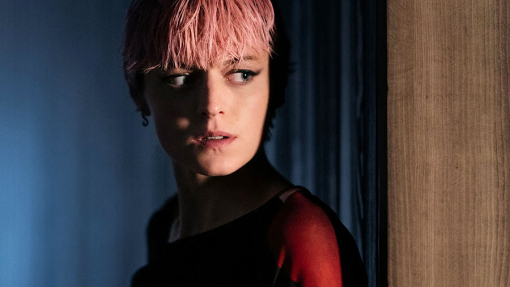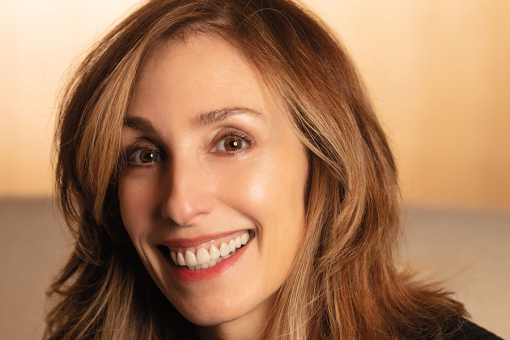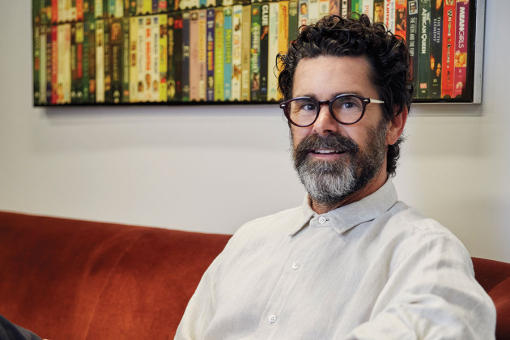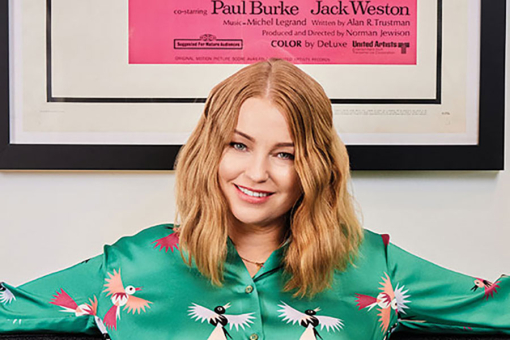Days before the March 4 Oscar broadcast on ABC, with eight new midseason shows launching in the next month, Channing Dungey, the network's entertainment president, is feeling a little worried — about a blemish on her face.
"It's always at a really inopportune time," she says. "It's not like I don't have lots of events this week to look nice for, but that's fine!"
It's a moment of disarming self-consciousness that makes Dungey feel totally relatable — like your best girlfriend — though she's one of the most powerful women in Hollywood and an industry pioneer. The first African-American executive to lead a network entertainment division, Dungey stands out as a strong exception to Hollywood's lack of diversity in the Time's Up era.
Being a "first," however, has come with a level of attention that, quite frankly, took Dungey by surprise. She knew her appointment in 2016 would be big news in the Hollywood trades, but she did not expect interest from mainstream media outlets across the country.
"That was kind of mind-blowing, and almost too much to process, because I am a very private person, and I am not a person that's really comfortable being in the spotlight," she says. "My sister's an actor. That's her comfort zone. One of the most difficult things for me about this job is how often you have to have interviews and have your picture taken and have your hair and makeup done. I'm like, I just want to talk about story and be in the room with writers and just have fun, you know?"
It's one of the reasons creative types adore her. "She doesn't feel 'Hollywood,'" says David Shore, executive producer of The Good Doctor. The hit drama, about an autistic surgeon, has been renewed for a second season. "She's very down-to-earth. I have always found her smart, insightful — a straight-shooter. There are no games going on."
Along with her younger sister, Merrin (Alias, Big Little Lies and the upcoming The Fix), Dungey grew up on a cul-de-sac in Sacramento. Their mom was an ex-teacher and their dad was a general services manager at the municipal utilities district. "We had the kind of house where people would come after school and hang out and play games," Channing says. "It was like a mix of John Hughes-ville meets Steven Spielberg-ia, and it felt like a very safe, happy place."
An avid early reader and an excellent student, Channing skipped a grade. "My parents used to call her Business Face," Merrin says. "She's very serious about a lot of stuff. I remember we went to the grocery store once, and she read an entire 348-page book in like an hour and a half. She's intense." Channing also liked being in charge. "I would get very into setting up the games and organizing the rules of the games," she recalls, "and my sister would be like, 'Can we just play now?'"
The sisters wound up together at UCLA, where Channing graduated magna cum laude. Yet Merrin managed to steal the spotlight from her sister's graduation honors.
"That was the year I won the UCLA acting award, and I was the youngest person to do so. That's all anybody could talk about, because Denzel Washington gave me my award, and I completely overshadowed her," Merrin says. "So, she was super mad about that forever. But she became the first black president of any network the same year I was doing Conviction and Big Little Lies. So it was like, okay, you win. Now everybody's talking about that, and mine doesn't matter."
Dungey started out studying political science, but, after taking a couple of film and TV classes, she switched majors. She soon realized she had little talent for writing screenplays.
"The kindest thing that you could say is that they were sort of a bad version of the old ABC Afterschool Specials — really earnest," she says. Nevertheless, "I loved working with the other students and reading their material and offering feedback, and I would get into these great discussions, and then I would hear from my classmates how much they liked my feedback."
Dungey told her professor, "'Look, I know my scripts are terrible, but this is my favorite class, because I love this part of the class, and I wish that you could just do this.' He laughed at me, and he said, 'Well, you know what? That's called script development, and there are a lot of people who do that for a living who aren't as passionate about it as you are.'"
The Monday after she graduated, Dungey started working full time as an assistant to a producer. "In retrospect, I regret a little bit that I didn't travel Europe for the summer, because I have had the good fortune to have gone from job to job the whole rest of my career," she says. "Every once in a while you hear about somebody getting paid out of a job and going to spend a year in Tuscany, and I'm like, 'Exactly how do I get on that plan?'"
She spent the first half of her career in the film business, working with producer John Davis, then actor Steven Seagal and then with executive Lucy Fisher as a creative exec at Warner Bros. There, she developed The Matrix, The Bridges of Madison County, Heat and Space Jam. "It was an exciting time in the movie business. That was the mid-'90s, and the spec market was just bananas. I mean, specs were selling for millions and millions of dollars," she recalls. "I worked on 19 movies in a span of about four years."
Around the turn of the millennium, as the studios narrowed their focus to big action films, many talented writers migrated to television. Dungey soon followed, landing a job as vice-president of drama at ABC Studios in 2004, the year Shonda Rhimes created Grey's Anatomy. Grey's was considered the "runt of the litter" at a time when Desperate Housewives and Lost also launched, but Grey's was Dungey's favorite project, so she was thrilled when asked to be the executive on the show.
"I had no idea who Shonda was, but I really responded to her narrative voice," she says. Of course, Grey's not only remains on the air 14 years later, it launched a spinoff in March, Station 19.
Having Grey's land in her lap was a lucky break, but during Dungey's first year at ABC Studios, she oversaw three pilots — and all were picked up to series. Soon she was promoted to head of drama at the studio and subsequently at the network in 2009, developing Scandal, How to Get Away with Murder, Private Practice and CBS's Criminal Minds, among others.
Ben Sherwood, cochairman of the Media Network Group and president of Disney/ABC Television, remembers meeting Dungey eight years ago, when he was heading ABC News, with "a bunch of serious, earnest guys in suits," he says. "My immediate impression was, Wow, she's cool. She's a lot of fun. She's really smart. She's doing great work, and I'd like to know her."
Two years after moving into his current post, Sherwood tapped Dungey to replace Paul Lee. He describes Dungey as "a radiant figure at the company" and someone "one instantly notices because of her sparkle, her intelligence, her great sense of humor and her sense of fun."
So far, they seem to be clicking. "Working with Channing is a breeze," Sherwood says. "She is extremely collaborative. She's very transparent. She's a really good communicator." When asked how the two divide their duties, Sherwood — considered a hands-on manager — laughs and wonders how Dungey would answer the question.
"My view is that she runs the entertainment business at ABC," he says. "She's responsible for the day-to-day, and she's responsible for the big decisions. I'm here to help support her, to encourage her, to challenge her, to test her ideas, to weigh in, to offer support. She's a formidable businesswoman. She's got great instincts, and she's really taken charge of the place."
Last fall marked the launch of Dungey's first full development slate, including The Good Doctor, which finished its first season as ABC's most-watched freshman drama in 13 years. Midseason launches, meanwhile, proved promising — until they didn't. The reboot of American Idol was met with what Sherwood called "sniping" and skepticism, but it debuted solidly, while Roseanne's comeback reached stratospheric territory.
With 18.1 million viewers, the premiere was the highest-rated sitcom broadcast in more than three years, outperforming Roseanne's original 1997 series finale. The lead character — played by Roseanne Barr — was a Trump supporter who fights with her pussy-hat-wearing sister, and ABC was proud to take on these tough issues and depict the nation's political diversity.
"What's happening for so many of us is that we have relatives and friends in different parts of the country who voted different ways," Dungey said before the reboot debuted in March. "I like the fact that we're representing different points of view. We've had a lot of conversations in the wake of the 2016 elections about the people in this country who don't feel like their voices are being heard."
Nevertheless, Dungey, the first African-American woman to helm a network entertainment division, did not hesitate to cancel the show after Barr took to Twitter with a racist tirade against a former aide to President Obama.
"Roseanne's Twitter statement is abhorrent, repugnant and inconsistent with our values, and we have decided to cancel her show," Dungey said in a statement May 29 (after the print version of this story went to press). Dungey's decision shows that representation in the executive suite matters.
The network's emphasis on inclusion is reflected in family comedies black-ish, Speechless and Fresh Off the Boat, and dramas such as The Good Doctor. It's also seen in Grand Hotel, coming to the air next season from executive producer Eva Longoria and with a largely Hispanic cast, led by Demián Bichir and Roselyn Sánchez.
Whether it's for Asian families or people with disabilities or the first black Bachelorette, ABC is now known as a network where the underrepresented see themselves reflected onscreen. And that's true behind the scenes, too, among the creative talent and in the executive suite.
"I do think that it helps to have a woman, and particularly a woman of color, at the top," Dungey says. "I love when I sit with my direct reports to see how many women and people of color are around that table. Head of comedy is a black woman [Jamila Hunter, senior vice-president, network comedy]. Head of current is a woman [Vicki Dummer, head of network current programming]. Head of casting is a black woman [Ayo Davis, senior vice-president, casting]; her two top lieutenants are Hispanic [Claudia Lyon and John Villacorta, both vice-president, casting]. It's a very diverse casting department, and I think that that certainly has an effect on the way that we cast our shows."
Affluent female viewers are ABC's "sweet spot," and women were tapped to direct nearly half of ABC's pilots this year, an unprecedented number. "We know there's still so much underrepresentation below the line, behind the camera," Dungey says. "We're really proud this year of how many female helmers we have on our pilots."
Dungey sits on the board of the nonprofit Step Up, which helps mentor girls in under-resourced communities, and she understands her own significance to those coming up behind her. "If I'm able to inspire young women of color to reach the highest levels in terms of executive achievement, then that's fantastic, right? As the mother of a biracial daughter, I take that responsibility very seriously.
"I am honored to sit in this chair. I don't take that for granted, but I also feel like I'm here because of a lot of hard work." That hard work involves "email at all hours of the day or night, phone calls at all hours of the day and night," according to Sherwood. They're managing the challenges of viewers migrating to streaming services, while maintaining a realistic optimism about the future, stemming in part from a planned acquisition of 21st Century Fox's film and TV studios.
"The possibilities are really exciting," Dungey says. "Bob [Iger, chairman and CEO of The Walt Disney Company] has spoken a lot about the potential here, and I certainly share his enthusiasm. Whatever is happening with all that is happening so far above my pay grade. We'll see how all that nets out. I do share his enthusiasm for the possibilities."
And if you're wondering about that daughter Dungey mentioned, she happens to be five. Dungey also has a one-year-old son. "She's not doing this with a 10-and a 12-year-old," Merrin says. "She's wiping butts! I'm just going to break it down. Here's the real deal on Channing: bionic! This world is real, and she is the first prototype."
Dungey practically rolls her eyes when asked the inevitable question of how she balances such an intense job with young children — well aware that men in her position never face the same question. "I have a great husband and a great nanny," she says. (Her husband, who is hands-on with the kids, runs a creative content company that works with graffiti artists, some of whose art decorates her Burbank office.)
Nevertheless, "I struggle, as I think every working mom does, with trying to figure out how to take time for yourself," she says. "My husband and I went away over the three-day weekend in January, just for a little couple time. I went to get a massage, and they said, 'When was your last massage?' And I started laughing. I love a massage as much as the next girl, but that's going to, unfortunately, be the first thing to get kicked to the curb."
Dungey occasionally ducks away from her standing desk in the middle of the day to attend her daughter's orchestra recital, and when she's with her kids, she turns her phone to airplane mode so she can take pictures without being interrupted.
"I was spending time this morning with my daughter, organizing the money to give back to the Girl Scout cookie treat lady," she says. "We actually sold out her first batch. We were at Ralphs [market] Saturday at eight o'clock. [My daughter] and a bunch of her fellow Girl Scouts were out there with their signs, cute as buttons, trying to get people to buy cookies. We sold almost $700 worth of cookies that morning. That was pretty cool."
With a life this full, it helps to be highly organized. "If you walk in her closet, it looks like a store layout," Merrin says. "Oh, my God, she's the neatest person ever — it's astonishing. It's perfect."
But, like many self-described "Type-A people," Channing tends to home in on and magnify the tiny imperfections, like that blemish appearing during Oscar week. What that really comes down to is something she thinks people might be surprised to learn about her: she's actually an introvert.
"There are some people that I think of as solar-powered people. My husband is one of those. As long as they're around other people, they benefit from their energy, and they can keep going and going," she says.
"I am more of a battery-powered person. When I'm fully charged, I'm good to go, but when I have big social periods, like the one that I'm in right now — I have a number of speeches that I have to give this week, I did this interview today, we have the Academy Awards on Sunday — I'm going to come out on the other side of that, and I'm going to need to really turtle for a little bit."
An earlier version of this article appeared in emmy magazine, Issue No. 6, 2018











